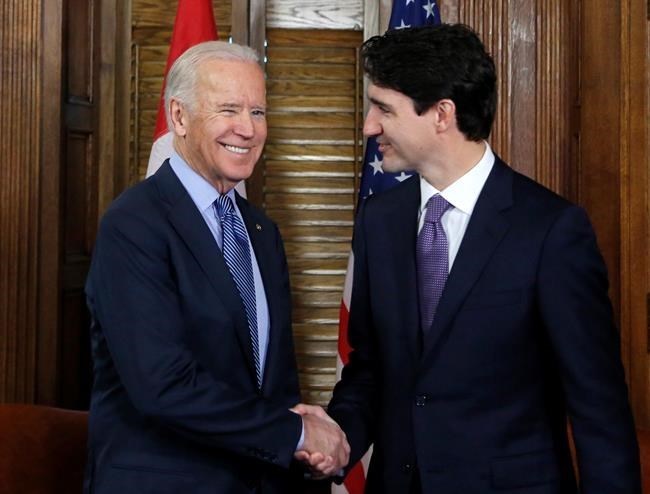
Prime Minister Justin Trudeau shakes hands with US Vice-President Joe Biden on Parliament Hill in Ottawa on Friday, December 9, 2016. THE CANADIAN PRESS/ Patrick Doyle
Republished December 10, 2016 - 3:35 AM
Original Publication Date December 09, 2016 - 1:30 PM
OTTAWA - The widespread mockery and ridicule around the Liberals' approach to electoral reform that marked the beginning of the week in federal politics was almost a distant memory by the end of week, as U.S. Vice-President Joe Biden came to Ottawa to plead solemnly for Canada to defend liberalism around the world.
The mydemocracy.ca online voting quiz brought out the cynical side of Canadian political humour, with no end of clever social-media jokes and Photoshopping about the country's various political animals — all at the expense of the Liberals.
But serious politics soon overtook sarcasm as First Nations chiefs, Biden and the premiers descended upon the national capital to hold counsel with the prime minister and his cabinet about the environment, health care and Canada's place in the world.
There were other moves worthy of notice all the same: government promotion of coding, announcements on military equipment and talks on climate change were all concrete manifestations of politics this week. Here's a run-down.
CLIMATE
The long-awaited first ministers meeting on climate was initially shaping up as anti-climactic, given the federal government's efforts to till the soil for a national emissions-reduction plan. It would be vague, but widely supported, and put the country on a solid path to cutting greenhouse gases.
But history knows that friction often ensues when premiers and the prime minister get together, and Friday's meetings were no different.
Aboriginal leaders balked at being left out of the afternoon session. Saskatchewan Premier Brad Wall turned up his nose at any suggestion of a carbon tax, eliciting a civil but terse exchange with Prime Minister Justin Trudeau during the closing news conference.
B.C.'s Christy Clark said she wouldn't sign anything that treats western oil-producing provinces the same as hydro-hungry central Canada, but won concessions that will allow her government to decide when to raise its own price on carbon.
And Manitoba Premier Brian Pallister flat-out refused to sign on without first getting additional federal help for mounting health care costs.
CODING
Prime Minister Justin Trudeau dropped by the Ottawa offices of Liberal high-tech darling Shopify on Monday to throw his weight behind an effort to expose more children to computer coding.
Researchers say there will not be enough skilled Canadians to fill the jobs being created by the tech sector in coming years. And they're urging more exposure to the building blocks of computer programming for students of all ages.
The skills mismatch is of central concern to Trudeau's policy efforts leading up to the next budget expected in February.
So far, most of the efforts to teach kids coding take place in after-school clubs or summer camps. British Columbia and Nova Scotia have made coding part of their school curricula. But education is a provincial responsibility. Will Trudeau and his budget be of any help?
SEARCH AND RESCUE
After 14 years of fussing around with scandal-plagued procurement attempts, the federal government has finally announced a way for Canada's military rescuers to do their jobs without risking the need of a rescue themselves.
Defence Minister Harjit Sajjan and Procurement Minister Judy Foote say they will spend $2.3 billion to replace the aging search-and-rescue planes with 16 new Airbus C-295s, which will start arriving in 2019.
The current fleet is between 20 and 40 years old, and is involved in more than 350 rescue missions every year, often saving lives. The fleet has long been in need of replacement, but an initial attempt more than a decade ago was deemed to be rigged. Then, the process slowed to a crawl and the prices started to soar — even as the planes fell into disrepair.
The saga seems to be over for now. Unless, of course, there are lawsuits from competitors.
News from © The Canadian Press, 2016